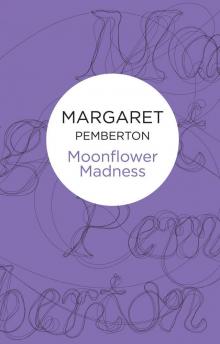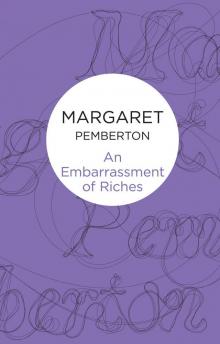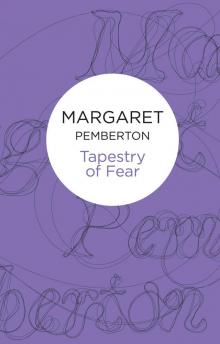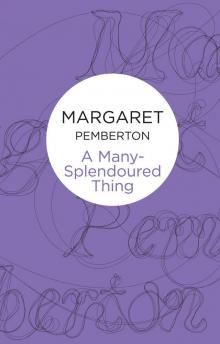- Home
- Margaret Pemberton
The Summer Queen Page 8
The Summer Queen Read online
Page 8
It was different, however, for Sergei, who was the Tsar’s next brother in age and who, although not in immediate line of succession to the Romanov throne, was certainly high up in line.
May raised her face to the blissful heat of the Umbrian sun and continued thinking about the hereditary sickness that ran like an ancient curse through the lives of Aunt Queen’s children and grandchildren, and which – as she wasn’t a direct descendant of Aunt Queen – mercifully hadn’t affected her and her brothers. Its medical name was haemophilia, but ‘the bleeding disease’ was how it was always referred to within the family. The first person to suffer from it had been her Uncle Leopold, Aunt Queen’s eighth child, whose blood ever since babyhood had refused to clot in the normal manner.
‘When your poor dear Aunt Queen was told Leopold was a haemophiliac, she was utterly bewildered,’ her mother had said when explaining it to her. ‘Why would a disease, which Aunt Queen’s doctors have told her is only passed down in the female line and only affects male offspring, have suddenly showed itself in her lineage? There is absolutely no explanation for it. Even worse for Aunt Queen is the knowledge that although her daughters and granddaughters will never suffer from the disease, they are carriers of it, and any sons they have are at risk of being born with it.’
After a life of pain when every bump and knock caused excruciating bleeding into his joints, her nice, kind Uncle Leopold had died of a brain haemorrhage. It was the same way that, after a fall, Alicky’s haemophiliac little brother Frittie had died. In the extended family descended directly from Aunt Queen, ‘haemophilia’ was a word that was never spoken, but was never far from their thoughts.
Wishing her own thoughts hadn’t veered onto a subject so dark, May turned them to something lighter: the St Petersburg wedding list. Uncle Wales and Aunt Alix would be among the wedding guests; Uncle Wales because he would be there representing Aunt Queen, and Aunt Alix because her sister was both the Tsarina and Sergei’s sister-in-law.
Although Uncle Wales hadn’t allowed Eddy and Georgie to attend Vicky and Louis’s wedding, she was fairly sure he would want them to attend Ella and Sergei’s. He wouldn’t want to waste an opportunity for them to get to know their Romanov cousins better, especially as Cousin Nicky, who was only four years older than Eddy, would, on his father’s death, be Tsar of all the Russias at probably the same kind of time as Eddy would be King of the United Kingdom and Emperor of India.
She wondered who else would be there and realized that, at such a big wedding, everyone she could possibly think of would be there. As their mother was the groom’s sister, Missy and Ducky would be there. Toria, Looloo and Maudie would be there. Aunt Lenchen, Uncle Christian and all four of their children, Christle, Albert, Thora and Marie-Louise, would be there, as would her Hohenzollern cousins – with the likely exception of Willy, who certainly wouldn’t want to see another man marrying Ella. Relatives from nearly every country in Europe would be in St Petersburg. The only family members not there would be her parents and herself.
With the letter she was in the middle of writing now almost forgotten, May wondered how she felt about being so excluded. The answer was immediate, for she didn’t feel bad about it at all, and that was because she was enjoying her life in Italy so much. It was a way of life she had never previously experienced; a way of life 100 per cent preferable to the rigid formality the wedding guests would soon be enduring at the Winter Palace in St Petersburg.
She stared thoughtfully into the middle distance at the broad, glittering surface of the Arno, realizing for the first time that it was even preferable to her former life in England. In England, her social life had revolved around the occasional visit with her mother to Aunt Queen at Windsor; to the Edinburgh family at Clarence House; and, with far greater frequency, to the Waleses at Marlborough House. At no time had she socialized with anyone other than family and extended family. Everyone had been royal or, as she herself was, semi-royal.
In Florence, life was far different. Some of their new friends were royal, but many others were not. What had been an eye-opener to her was how, in Florence, her parents happily socialized with fellow exiles who were not even aristocratic and possessed no other title than Mr, Mrs or Miss. Even more extraordinary was that they had been happy for May to make similar friendships, and at the art-history class that she attended at the Uffizi she had made friends with Rowena Daly, who was an American, and with Belinda Light, who was a niece of Miss Bianca Light who had loaned her parents I Cedri.
In England she would never have been allowed to make such friendships, and she most certainly wouldn’t have been allowed to saunter down Bond Street – or anywhere else – unaccompanied by anyone except a couple of girlfriends. Now, in Florence, her parents turned a blind eye when, after art class was over and in the company of Rowena and Belinda, she explored the little shops that lined the nearby Ponte Vecchio. Even better was when she strolled in the countryside around I Cedri, picking wild flowers to press, in the company of her mother, Miss Bianca Light and Mr Thaddy; and sometimes, even better, with Belinda, Belinda’s aunt and Mr Thaddy.
It was a taste of life that was unremarkable to her two friends, but which May had never experienced before, and the dizzying novelty was compensation aplenty for not attending Ella and Sergei’s wedding.
She picked up her pen again, wrote Never before have I been so happy, and came to a halt, overwhelmed by the realization of why she was so happy. Quite simply, it was because she no longer felt herself to be an outsider. Among her new-found friends, and in her new-found way of life, it didn’t matter that she was ebenbürtig. Ebenbürtig was an ugly word that her Florentine friends didn’t know and, if they had known, wouldn’t have cared about. The reserved, withdrawn young woman May had once been was – now that no such shield was needed as protection from hurtful remarks – no longer reserved and withdrawn. Instead she was outgoing, carefree and not only laughed easily and often, but did so out loud in a way that at Windsor, or at Marlborough House, would have been considered extremely vulgar. It was a transformation so wonderful that she never wanted it to end.
For the first time, it occurred to her that being born royal was to be born in a kind of prison. Rowena and Belinda could fall in love with whomsoever they pleased and marry whomsoever they pleased – an option that when her family’s exile finally came to an end, and she and her parents returned to England, would not be open to her.
All that would be open to her was either marriage to someone semi-royal who, for very good reasons, no one else in the family was willing to marry, or spinsterhood. Neither option was remotely enticing.
But what if, when her family’s exile came to an end and they returned to England, she didn’t remain there? What if she returned to Florence and met and fell in love with someone who, like Mr Thaddy, was handsome and fun and non-royal? And what if this unknown person in her future loved her passionately in return and wanted to marry her? It was a scenario so revolutionary the blood pounded in her ears.
She thought of how out of sight and out of mind she had already become. Who, within the vast family that she was such a fringe member of, was likely to care if plain May Teck kicked over the traces and, living far enough away not to be an embarrassment, married someone non-royal? The answer was that she couldn’t imagine anyone caring very much.
In a nearby cedar tree, two chaffinches wrangled noisily. She rose to her feet and the birds immediately ended their quarrel, flying away in the direction of the river. May watched them until she could see them no longer, knowing she had come to a realization that, if she allowed it to, would alter the course of her life
Writing All my love, your Kindred Spirit May, she finished her letter and then, picking up her writing case, began walking back to I Cedri. There, full of his devastating Irish charm, Mr Thaddy would shortly be arriving in order to continue work on her portrait.
Chapter Eight
MAY 1884, NEUES PALAIS, POTSDAM
It was barely dawn; still dark, an
d they were coming for Willy again. They were coming to force him into the iron monstrosity, to strap him into it for hours and hours, his head at an impossibly awkward angle, his body convulsed in pain. They were dragging him from his bed. He was kicking and screaming, shrieking for his mama, begging her to tell the men to let him go; but his mama was saying it was for his own good. His mama was saying he had to be put into the iron machine so that one day he would look as other boys looked; so that he would be able to run and ride, and eat with a knife and fork just like other boys; so that he would no longer be an embarrassment to her and a shame to Prussia, the country that he would one day rule. The hard leather of the straps bit into his four-year-old body. The icy cold of an iron restraint pressed hard against his forehead. ‘No!’ he was shouting. ‘No! No! No!’
As always, Willy’s own terrified shouts woke him. He was bathed in sweat, his heart pounding, his pulse racing. He fought free of the tangled sheets; screamed, ‘Get out!’ at the almost equally terrified valet who, as ever on such occasions, had nervously entered the room; swung his legs over the edge of the bed and, like the small petrified child he had once been, covered his face with his hands and wept.
Later, when he had recovered a semblance of control, Willy wiped the tears away, heaved himself to his feet and shrugged himself into a tartan dressing gown. Then he walked wearily to the window and pulled one of the two heavy curtains to one side.
His bedroom overlooked a lake that stretched the entire east side of the palace and, in the ethereal light of breaking dawn, two swans glided serenely upon it. Having mated for life, the pair were always together. Mercifully, always being together was not something that applied to Willy and Dona. Her bedroom was a conventional distance away from his on the other side of their separate bathrooms, dressing rooms and sitting rooms and, even if she had heard his terrified shouts, he doubted if Dona would have had the nerve to walk in on him and try to wake him.
And he most certainly wouldn’t have wanted her to. Dear God, he didn’t want anyone ever to see him screaming with fear and sobbing like a child: not his valets, not his wife, not anyone. It was too far removed from the image he projected of himself, an image that was far different from the real Willy – the timid, not-very-clever Willy whom he had long learned to keep hidden under a cloak of constant pretence; a pretence that had become a way of life.
He had been six when he discovered what a difference and a comfort pretending to be someone he wasn’t could be. It had been a cold autumn day and he was to accompany his grandfather, the Kaiser, to the parade ground at Potsdam. Dressed appropriately in a Foot Guards uniform made especially for him, he was marching up and down, practising, in the hope that his grandfather would allow him to march with the soldiers.
Watching from a distance, his mother had called Willy across to her and he had run to her, eager for her praise, for praise from his mother was seldom, if ever, given. With his face shining in happy expectation, he had floundered to a halt in front of her and waited for her to tell him what a wonderful little soldier he was, and how proud his grandfather would be of him when he saw him in his uniform. Instead she’d said tartly, ‘Do stop making such an exhibition of yourself, Willy. In uniform you look like an organ-grinder’s monkey.’
His happiness had been destroyed at a stroke and he had hated her for destroying it; hated her for – as she always did – making him feel ridiculous and insignificant. He had sought refuge in his playroom and had stood in front of a mirror, tears scalding his face. ‘I do not look like a monkey! I do not! I do not! I do not!’ he had shouted at his reflection time and again.
When he had shouted himself hoarse, he dragged a scarlet cloak from his dressing-up box and flung it around his shoulders. Then, still wearing the helmet that was part of his uniform, he snatched up a toy sword and, in front of the mirror and uttering war whoops, began swirling it round and round above his head. Suddenly he was a crusader knight storming the walls of Jerusalem to free the city from the infidels; he was Alexander the Great, conquering the known world; he was his grandfather leading the Prussian Army to glorious victory in the Austro-Prussian War of twenty years ago.
And even when, without the cloak, it was time to leave for the parade ground, the sensation that he had aroused in himself remained, for Willy had discovered a precious secret. If he imagined himself to be invincible, then he became invincible.
He hadn’t known at six years old what an inferiority complex was, or why he had one, but he had discovered a way of living with one. He simply pretended to be all the things he wanted to be and wasn’t; and, because he never let the pretence down, the world didn’t know the real Willy – the not-very-brave, not-very-clever Willy. They only saw his steely gaze and his aggressive bearing; his arrogance and swagger and know-it-all superiority. It was a pretence lived so utterly and completely that even his mother no longer knew the true Willy – and Dona had never known him.
It was growing lighter now. The first fingers of dawn stabbed the sky, no longer so pale as to be barely visible, but a pure and piercing deep gold and rose-pink.
With his hands plunged deep in the pockets of his dressing gown – one that had been a gift to him from his grandmother on his last visit to Windsor – he thought about his mother. Even now that he was a grown man, she was still as brutally critical towards him as she had been when he’d been six. The difference now, though, was that he no longer cared.
A couple of years after the organ-grinder monkey incident, his grandfather had begun to take an interest in him, as had Bismarck, his grandfather’s formidable Chancellor. They were the two people he idolized most in the world. His grandfather because he had led the Prussian Army into battle against Napoleon, and Bismarck because, with blood and iron, he had welded together a hotchpotch of kingdoms, principalities and grand duchies into a strong, unified empire. And both men disliked his mother just as much as Willy did.
When he had asked his grandfather why he disliked his mother so much, his grandfather had replied bluntly, ‘Because she is an Engländarin. Because she has infected your father with English liberal ideas and because she rules her husband in a way no German wife would ever dare to do.’
He had then gripped Willy hard around his shoulders. ‘Promise me,’ he’d said, his white handlebar moustache quivering with the force of his emotion, ‘promise me you will only ever marry a German princess. A German princess will know her place. She will never try to rule you, as your mother rules your father. All you will need from her is that she bears you sons, for to father sons is the duty of a hereditary monarch. Do you understand, Wilhelm? Do you promise?’
He had promised. And he had kept his promise. He had married Dona, who, before their marriage, had been Her Serene Highness Princess Augusta Viktoria of Schleswig-Holstein and who was now Her Royal Highness Princess Wilhelm of Prussia.
He hadn’t been in love with her. He’d been in love with Ella, and he was still in love with Ella. He would always, until the day he died, be in love with Ella. But Ella had rejected him for Sergei Romanov, a man so unappealing that in a crowded room he was always to be found standing alone. Blind with bewilderment and hurt, desperate to save his pride, Willy had left immediately for Schleswig-Holstein and had proposed to Dona, the daughter of one of his father’s friends.
It had been an act of impulse, but then he was always impulsive. Being impulsive was something he simply couldn’t help. It was part of his psyche. And he’d known there wasn’t a one-in-a-million chance of suffering another rejection. As a Serene Highness, the homely and dim-witted Dona was insignificant in the royal marriage stakes. So much so that it would never have occurred to her, or to her family, that she stood the slightest chance of a distinguished marriage – far less of marriage to a man who would one day be Germany’s emperor.
Her homeliness hadn’t mattered to Willy. Although far from beautiful, when she smiled she was pleasant-looking and he’d never been stirred by any woman’s beauty other than by Ella’s, and neither did
he expect he ever would be. Dona’s dim-wittedness hadn’t mattered, either. Instead he’d counted it one of her advantages, for the last thing he’d wanted was a fiercely intelligent woman who would meddle in political affairs, as his mother constantly did. All he’d wanted from his marriage was a wife who would be dutifully submissive, would bear him strong sons and, as a future empress, would look the part – and although she was plain, Dona did carry herself with impressive dignity.
He sighed heavily. In that she was submissive beyond reproach and, in three years of marriage, had given birth to three strong boys – the last only days ago – she had certainly fulfilled all he’d thought he wanted. What he hadn’t taken into account was that she would love him so cloyingly; that she would expect so much of his time and attention and that, God help him, she would bore him to such an extent there were times when he thought his nerves would give way under the strain of enduring it.
His way of coping had been to spend as little time with Dona as possible. They breakfasted together and then, making courteous insincere apologies about not being able to spend more of the day with her, he speedily departed for regimental headquarters, where he ensured that his duties as colonel and commander of the Hussar Guards kept him away from the palace not only for the whole day, but every evening as well.
Spending time with his regiment was no hardship. It was what he lived for. He had always felt far more comfortable with men than he had with women. Riding with his fellow officers, parading with them and, in the evenings in the officers’ mess, drinking and enjoying practical jokes with them gave him a sense of completeness that he never experienced at any other time. The regiment was his safe harbour and refuge.

 The Summer Queen
The Summer Queen Moonflower Madness
Moonflower Madness The Londoners
The Londoners The Flower Garden
The Flower Garden Yorkshire Rose
Yorkshire Rose Vengeance in the Sun
Vengeance in the Sun Zadruga
Zadruga Beneath the Cypress Tree
Beneath the Cypress Tree Magnolia Square
Magnolia Square Party in Peking
Party in Peking Lion of Languedoc
Lion of Languedoc Forget-Me-Not Bride
Forget-Me-Not Bride The Guilty Secret
The Guilty Secret Rendezvous With Danger
Rendezvous With Danger A Season of Secrets
A Season of Secrets Silver Shadows, Golden Dreams
Silver Shadows, Golden Dreams The Four of Us
The Four of Us Devil's Palace
Devil's Palace Never Leave Me
Never Leave Me An Embarrassment of Riches
An Embarrassment of Riches African Enchantment
African Enchantment White Christmas in Saigon
White Christmas in Saigon Coronation Summer
Coronation Summer A Multitude of Sins
A Multitude of Sins Tapestry of Fear
Tapestry of Fear A Many-Splendoured Thing
A Many-Splendoured Thing